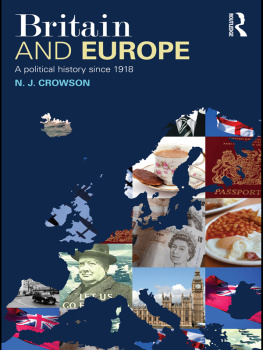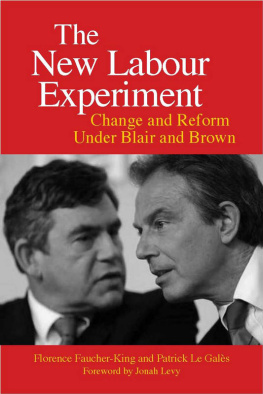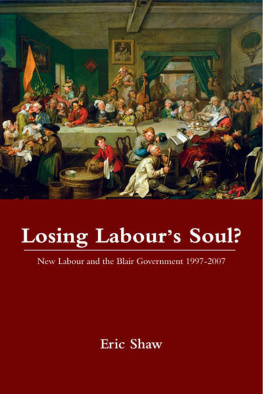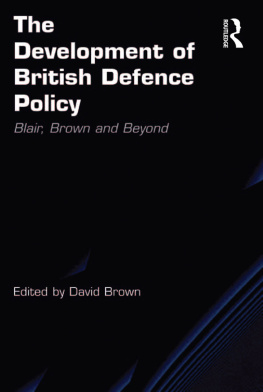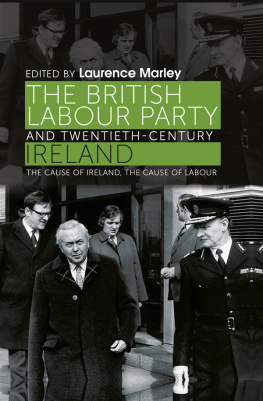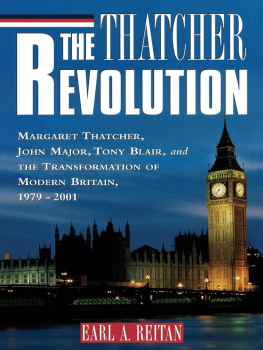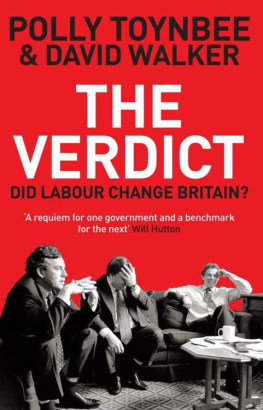Copyright Oliver Daddow 2011
The right of Oliver Daddow to be identified as the author of this work has been asserted by him in accordance with the Copyright, Designs and Patents Act 1988.
Published by Manchester University Press
Oxford Road, Manchester M13 9NR, UK
and Room 400, 175 Fifth Avenue, New York, NY 10010, USA
www.manchesteruniversitypress.co.uk
Distributed in the United States exclusively by
Palgrave Macmillan, 175 Fifth Avenue, New York,
NY 10010, USA
Distributed in Canada exclusively by
UBC Press, University of British Columbia, 2029 West Mall,
Vancouver, BC, Canada V6T 1Z2
British Library Cataloguing-in-Publication Data
A catalogue record for this book is available from the British Library
Library of Congress Cataloging-in-Publication Data applied for
ISBN 978 0 7190 7640 4 hardback
ISBN 978 0 7190 7641 1 paperback
First published 2011
The publisher has no responsibility for the persistence or accuracy of URLs for any external or third-party internet websites referred to in this book, and does not guarantee that any content on such websites is, or will remain, accurate or appropriate.
Typeset by R. J. Footring Ltd, Derby
Printed in Great Britain by Bell & Bain Ltd, Glasgow
For Elton, Justin, Tamsin, Joe and Freja
Preface
To mark its Presidency of the Council of the European Union (EU) in 2009, the government of the Czech Republic commissioned artist David ern to produce a sculpture put together by a team of twenty-seven artists, one from each member state, to celebrate diversity in the EU. When the huge installation, Entropa, was unveiled in the foyer of the Justus Lipsius building in Brussels in January 2009 it caused a furore in the political and art worlds alike. Controversy was initially sparked because it emerged that ern had commissioned not twenty-seven people but just three assistants to build the piece, and had written fake artist profiles and spoof descriptions of the thinking behind their efforts in the accompanying brochure. Still more debate surrounded the nature of the stereotypes on offer. Entropa came in the form of a huge blue three-dimensional snap-out-and-build plastic modelling kit, containing striking static as well as multimedia and moving elements. ern and his team themed the work around the playful analysis of national stereotypes as well as individual characteristics of the original cultural identities (ern 2009). For example, Germany was represented by cars driving up and down autobahns laid out in a shape more than reminiscent of a Nazi Swastika, Sweden was portrayed as an Ikea-style piece of flat-packed furniture, Cyprus was sliced in half and the French were on strike. The loudest public protest came from the Bulgarian ambassador to the EU, who was infuriated by his countrys depiction as a series of Turkish squat toilets. He demanded that the sculpture be removed before it was even unveiled (Hines and Charter 2009). A compromise solution was found whereby the Bulgarian piece of the kit remained in place but was hidden from view under a black sheet.
Britain featured in the top left corner of Entropa, but to say it actually appeared would be misleading because it was represented as an empty space. Twelve years on from Tony Blairs New Labour government coming to power exhorting Britain to engage constructively with the EU, and trying to help the British people feel at home in Europe, the impression persisted that Britain was both a member and non-member of the EU simultaneously. Britain, it could be argued, was in Europe geographically but not in spirit; in the EU diplomatically but not emotionally. Now, we could write off the Britain-as-empty-space idea as one artists impression, a humorous yet mistaken understanding of where the New Labour government took British European policy after May 1997. Tony Blair would surely make this point. But if New Labour successfully turned Britain into a constructive European actor in policy terms, why, by the end of the partys term in office, did so many British people consistently still show themselves to be either apathetic about, or hostile to, the EU after all those years of being led by a Europhile Prime Minister? Or did the enthusiasm New Labour professed for the EU extend only as far as the Europeanized decision-making elites who worked with their EU counterparts on a day-to-day basis? What part did media coverage of the EU play in shaping the publics attitudes to the EU and what did New Labour do to try to effect change in the British approach to Europe? This book attempts to shed some fresh light on all these questions and in so doing answer one that has eluded academics and policy-makers for decades: why do the British people still seem psychologically distant from the EU?
I wrote this book to analyse the way the British (or is it the English?) talk about Europe, how they perpetually construct Europe as a hostile Other and how the images they hold about Europe are expressed culturally in the pages of the most popular tabloid and broadsheet newspapers. It is in these basic, everyday, but potent ways that the British have been kept in what I call a permanent state of discursive war with the continent of Europe. At its heart, the book explores the propaganda campaign New Labour undertook to undermine the appeal of this vision of Britain being separate from a dangerous and subversive Europe. It studies the various tactics the Prime Minister and Chancellor taken to be the key progenitors of British foreign policy discourse used in foreign policy speeches after 1997 to convince the country of the benefits of a European future. They did this first by challenging the British public to rethink the meaning of Britishness and then by inviting them to reconsider memories of the national past. Tony Blair and Gordon Brown encouraged the public to see the Britain and Europe story not as one of an eternal separateness from the continent but as an always-European one in which globalization and interdependence transcended the narrow nationalist take on Britains past. The central argument in the book is that we can see in Blair and Browns foreign and economic policy speeches their logic of history at work. It was always going to be difficult for the government to alter attitudes on an emotive question such as Europe in a relatively short space of time and Blair and Brown were clearly up against it from the outset. However, through a close reading of their European discourses we come to a nuanced understanding of how it was they tried to project their own values and ideals onto the policies developed by the government and how they fought for them on the European and world stages. We find that New Labour was unsuccessful in trying to move the public towards its vision of Europe for reasons partly of their own making but partly beyond their control. So this book is about the Europe question in British politics but about much more too. It is about the art of rhetoric, persuasion and the techniques of modern political communication; it is about Blair and Browns leadership styles and management of the New Labour project; and, not least, it is about Britains place in the world in the twenty-first century. But much more than all that, this book is about the clash between two logics of history: the nationalist and the globalist. We find that the former logic maintains the upper hand in Britain for now at any rate.


